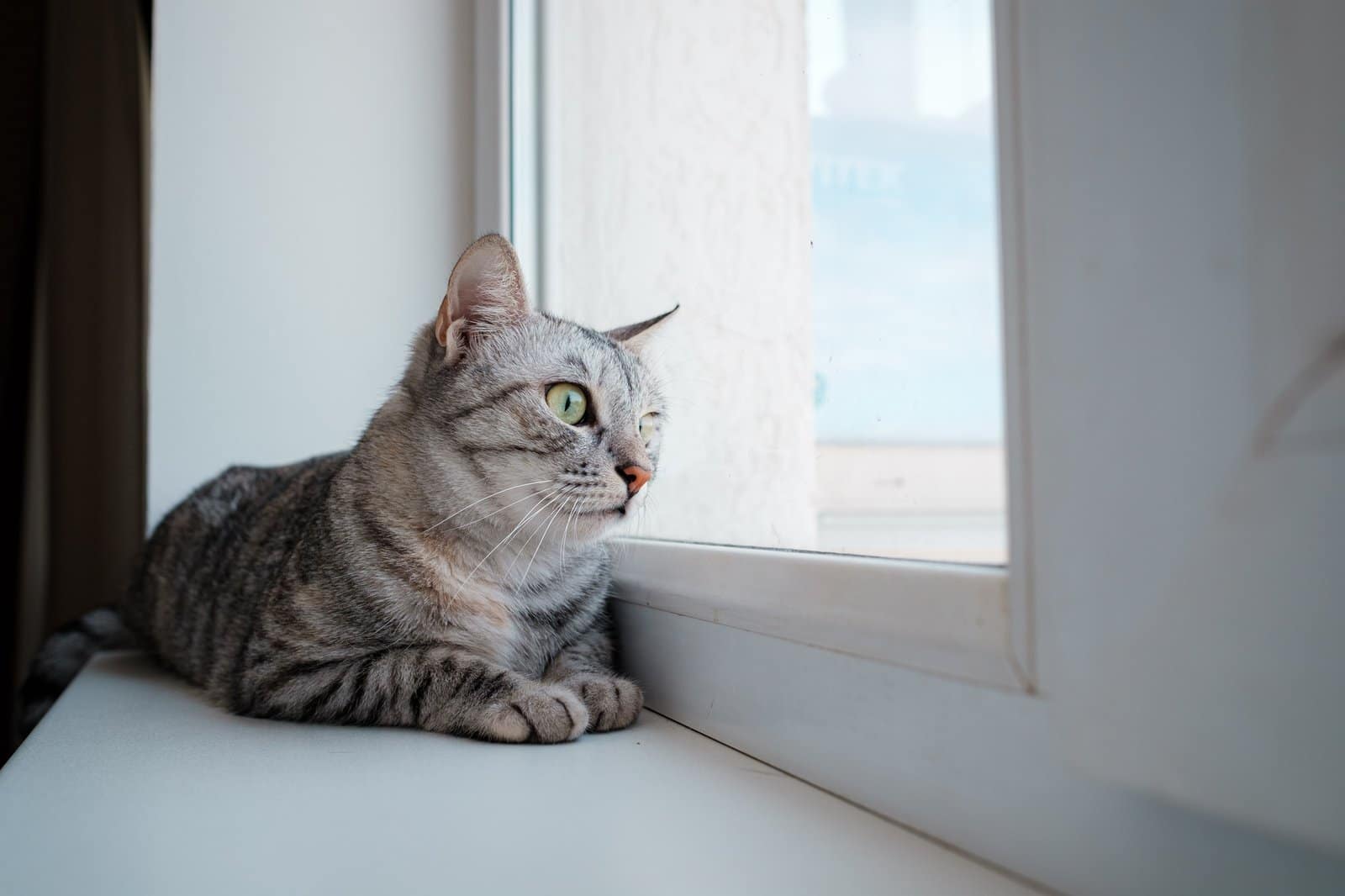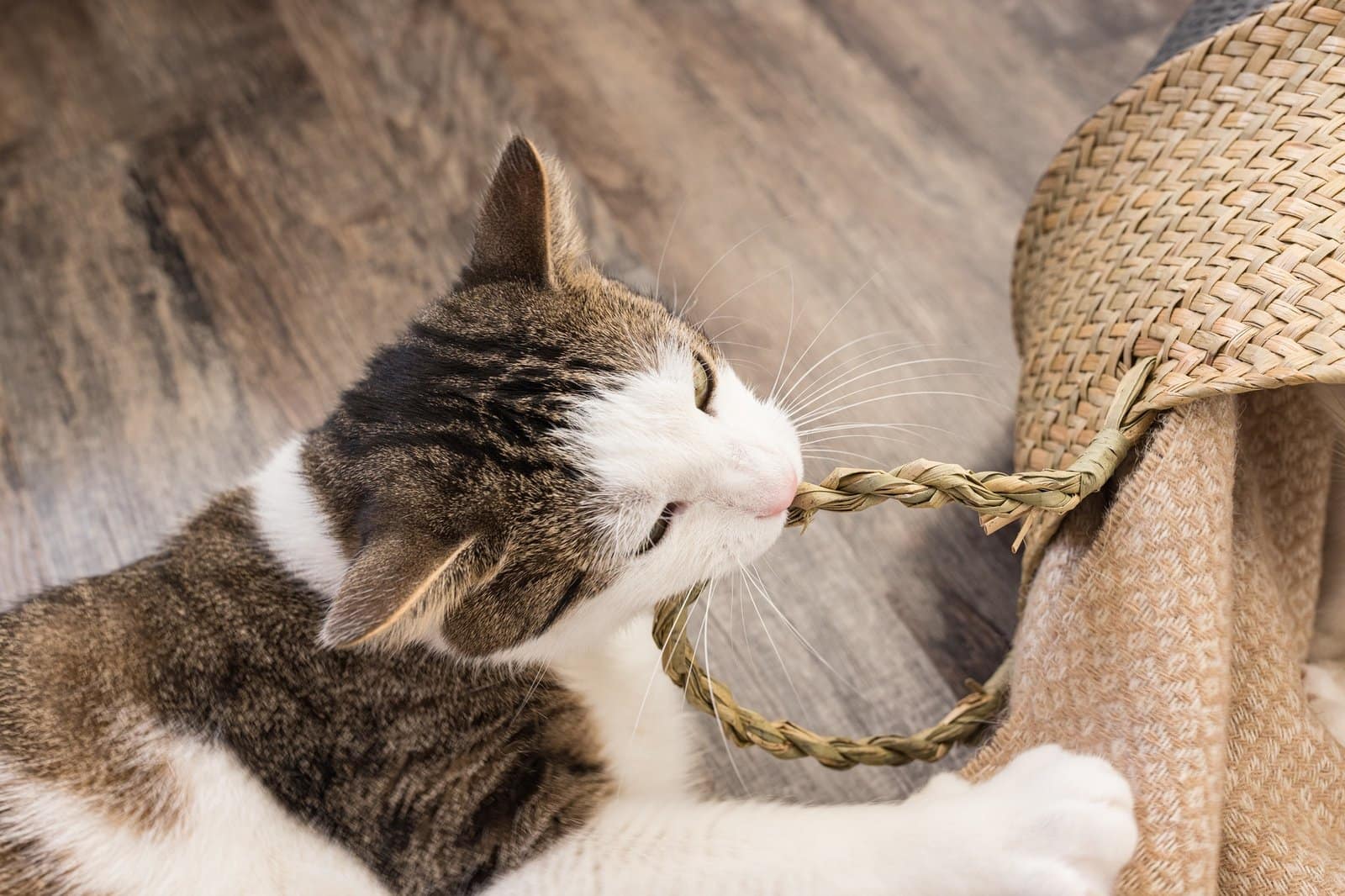“If your cat is peeing on your bed because of stress or anxiety—especially when you’re away or routines change—this guide gives you a step-by-step plan to fix it.”
Introduction: When Stress Turns into Bedtime Accidents
If you’ve just found cat pee on your bed again, you’re not alone — and you’re not a bad cat parent.
When cats are stressed or anxious, they often “speak” with their bladder. Your bed smells like you, feels safe, and becomes a target when your cat is overwhelmed.
The good news: stress-based peeing on beds is fixable. With a mix of vet checks, gentle changes at home, and a bit of patience, most cats can go back to using the litter box reliably.
In this guide, we’ll focus on cat peeing on the bed because of stress or anxiety — what causes it, how to spot the signs, and how to help your cat feel safe again.
Quick Answer: What to Do When Stress Makes Your Cat Pee on the Bed
If your stressed cat is suddenly peeing on your bed, you’ll help both of you fastest by doing three things in order: **rule out pain, remove the smell, and reduce the stress triggers. Here’s a simple plan you can start today:
1. Rule out medical issues first.
Cats hide pain well, and urinary problems can look exactly like “stress peeing.” Book a vet visit as soon as you can—especially if your cat is visiting the litter box often, straining, crying, or if you see blood in the urine.
2. Deep-clean the bed so it doesn’t smell like a toilet.
Strip all bedding and wash it on a hot cycle. Use an enzyme cleaner on the mattress and any soft surfaces your cat has peed on. Ordinary detergent or vinegar may leave behind traces that your cat can still smell and that quietly invite more accidents.
3. Protect the bed while you work on the real problem.
Until things are stable, keep the bedroom door closed when you’re not there, or use a waterproof mattress cover and an extra blanket on top. This reduces damage and helps you stay calm while you fix the underlying stress.
4. Identify what might be stressing your cat.
Think about any recent changes:
– moving house or redecorating the bedroom
– a new baby, partner, or pet
– tension between cats in a multi-cat home
– your schedule changing or you being away more than usual
Make a quick list—these clues will guide what to change.
5. Give your cat a safe, predictable “home base.”
Set up a quiet area where your cat can always retreat. Include a cozy hiding spot, litter tray, food, water, scratching post and a favorite bed or blanket. The idea is: *no one bothers the cat there, ever.*
6. Add daily play and calm, positive attention.
Short, focused play sessions with a wand toy (2–3 times a day) plus calm cuddle time can bleed off anxiety and give your cat a sense of safety. Try to feed and play at roughly the same times each day to restore a predictable routine.
7. Consider gentle calming support.
Ask your vet about options like pheromone diffusers, vet-approved calming supplements, or short-term medication for very anxious cats. These don’t replace environmental changes, but they can make it easier for your cat to relax while you work on the root cause.
If you follow this plan, most cats start to improve over the next few weeks. The rest of this guide walks you through why stress causes bed peeing, how to spot your cat’s specific triggers, and what to do if things don’t improve.
Why Stress Makes Cats Pee on Your Bed (Not Just in the Litter Box)
Cats don’t usually pee on your bed out of spite. When a cat is stressed or anxious, their brain and body go into “safety mode.” Stress hormones rise, routines get disrupted, and your cat can start avoiding the litter box or choosing places that smell strongly of you—like your bed.
Common patterns look like this:
A big change happens (move, new pet, new baby, travel).
Your cat feels unsafe, confused, or insecure.
They seek out places that smell like you and feel soft, high, or hidden.
Bed-peeing becomes a coping behaviour and a new habit unless the stress is addressed.
Below are the most common real-life situations where stress can push a cat to pee on your bed and what they might be trying to “tell” you in each case.
Cat peeing on bed after moving house or changing furniture
If your cat started peeing on your bed right after a move, renovation, or big furniture reshuffle, it’s very likely environmental stress.
Your cat is suddenly dealing with:
New smells, sounds, and floor plans
Different spots for hiding, resting, and watching
Possibly a new litter box location or type
Your bed may now feel like the only familiar, safe-smelling place, especially if your cat is still unsure about the rest of the home. That combination of high vantage point, soft texture, and strong “you” scent can turn your bed into an anxiety-soothing but very inconvenient toilet.
Key idea: if the timeline is “we moved → my cat started peeing on my bed,” think stress first (but still ask your vet to rule out medical issues).
Cat peeing on my bed after getting a new baby or pet
A new baby, puppy, or kitten changes everything from noise levels to routines to how much attention your cat gets.
Your cat might be:
Overwhelmed by new sounds, smells, and movements
Unsure about their place in the family
Getting less predictable interaction from you
Bed-peeing here often acts like a message: “I’m stressed and I don’t know what’s safe anymore.” Your bed smells like the “old normal”, so your cat gravitates to it and may pee there when their stress spikes.
Cat peeing on my bed because of other cats or bullying
If you have more than one cat, tension or bullying can absolutely lead to stress pee on the bed.
Watch for:
One cat blocking hallways, doors, or the litter box
Staring, chasing, or pouncing that always goes one way
One cat hiding more, using fewer rooms, or avoiding the box
A scared or lower-rank cat may avoid the litter box if it’s near the “bully,” and choose your bed instead because:
It feels high and safe.
It smells strongly of you (their “social buffer”).
It’s away from the conflict zone.
In these cases, the bed-peeing is about social stress and resource access, not bad manners.
Cat peeing on my bed when I’m at work or away overnight
If your cat only or mostly pees on your bed when you’re gone (at work, on trips, or overnight stays), separation-related stress is a strong possibility.
Clues:
The accident is usually found right when you come home.
Your cat may be extra clingy, vocal, or restless when you leave and return.
Normal box use returns when you’re home more consistently.
Your scent on the bed can be comforting when you’re absent, but if your cat becomes very anxious or frustrated, that comforting spot can turn into a place for stress urination. It’s not revenge—it’s your cat struggling to cope.
Anxious cat peeing on the bed during loud noises, visitors, or big changes
Some cats are naturally more sensitive and may start peeing on the bed when:
There are frequent parties or visitors
There’s construction or loud noise nearby
The household schedule keeps shifting
Arguments or tension in the home increase
These cats often show other stress signals: hiding, dilated pupils, fluffed tail, hypervigilance, or overgrooming. The bed becomes a soft, safe-feeling “island” where they try to self-soothe—and that can include urinating there when their anxiety spikes.
Is It Stress or a Medical Problem? Simple Checks Before You Assume Anxiety
Even if the timing strongly suggests stress—like a move, new baby, or travel—you should never assume stress is the only cause. Pain and illness can look like “behaviour problems”, and only your vet can tell the difference for sure.
Use this section as a simple checklist to decide how urgent a vet visit is.
Signs that need a vet visit as soon as possible
Call your vet promptly if you notice any of these along with bed-peeing:
Straining in the litter box or producing only tiny dribbles of urine
Going to the box very frequently but only passing a few drops
Crying, yowling, or showing obvious discomfort when urinating
Blood-tinged or very dark, odd-smelling urine
Licking the genital area excessively
Loss of appetite, vomiting, or extreme lethargy
These signs can point to urinary tract infections, bladder inflammation, crystals, or blockages, which can be serious or even life-threatening, especially in male cats. Behaviour help can wait; medical emergencies can’t.
Signs that stress is likely playing a major role
While a vet check is still important, stress is more likely if:
Bed-peeing started soon after a clear life change (move, new baby, new pet, travel, renovation).
Your cat seems otherwise bright, social, and eating normally.
Your cat still uses the litter box sometimes, but chooses the bed during or after stressful events (you leaving, visitors, noisy nights).
There are obvious triggers like conflict with other cats or a suddenly busier household.
Even in these cases, a vet visit helps rule out hidden problems and lets you talk about behaviour and stress management together.
How to talk to your vet about stress-based peeing
To make the most of your appointment:
Bring a timeline: note when bed-peeing started and what changed around that time.
Take photos or videos of any odd behaviour in or around the litter box.
Ask whether additional tests (urine test, bloodwork, imaging) are needed to rule out pain or disease.
Once serious illness is ruled out, ask for guidance on behaviour and environment changes to reduce stress.
Ruling out medical causes first means you can move on to the stress-focused plan with more confidence and less worry that you’re missing something serious.
Step-by-Step Plan to Help a Stressed Cat Peeing on Your Bed
Step 1: Deep-clean the bed so it stops “smelling like a toilet”
Cats have powerful noses. If the bed keeps a faint urine smell, your cat may return to the same spot—even if the original trigger has improved.
Use an enzyme-based cleaner specifically designed for cat urine on mattresses, duvets, and bedding.
Wash all washable items on a hot cycle if the care label allows.
If possible, temporarily cover the bed with a waterproof protector while you work on the behaviour.
Removing the scent doesn’t fix the stress on its own, but it stops the bed from acting as a “repeat invitation.”
Step 2: Make the litter box the easiest, safest choice
If a stressed cat feels even a little unsure about the litter box, your bed can start to look like a safer option.
Aim for:
One litter box per cat, plus one extra, in different parts of the home.
Boxes in quiet, low-traffic spots—not next to noisy appliances or behind doors that can be blocked.
Boxes big enough for your cat to turn comfortably and deep enough to dig.
A familiar litter type; big changes can be stressful during an already stressful time.
For multi-cat homes, place boxes so that no single cat can guard them all at once.
Step 3: Reduce or remove the stress trigger where you can
Think back to the patterns you identified:
Did bed-peeing start after a move?
After a new cat, dog, or baby joined the home?
When you started working longer hours or travelling more?
When another cat started bullying or blocking the litter box?
Where possible:
Give your cat gradual introductions to new pets or babies rather than forcing close contact.
Add vertical spaces (cat trees, shelves) so cats can avoid conflict without hiding under furniture.
If you’re away a lot, arrange consistent feeding and play visits or a sitter, not just food left out.
You may not be able to remove the trigger entirely, but even small tweaks can reduce how intense it feels to your cat.
Step 4: Create safe “cat-only” zones away from the bed
Give your cat dedicated spaces that feel as safe—or safer—than your bed:
Quiet corners with soft beds or boxes, ideally elevated, where they can watch without being disturbed.
Hiding spots (cardboard boxes with holes, covered beds) in a few key rooms.
At least one “sanctuary room” where visitors, children, or other pets don’t enter.
You want your cat to think, “When I feel overwhelmed, I go here, not to the bed.”
Step 5: Add daily play and predictable routines
Unpredictable life often equals unpredictable peeing.
Try to:
Play with your cat at least 1–2 times a day with interactive toys (wands, chasers) that mimic hunting.
Follow play with a small meal or snack to complete the hunt–eat–groom–sleep cycle.
Keep feeding, play, and bedtime as consistent as possible, especially during big life changes.
Many anxious cats calm down when they know what to expect each day.
Step 6: Use gentle calming aids alongside behaviour changes
Calming aids won’t fix the problem alone, but they can make behaviour work easier:
Pheromone diffusers or sprays placed near your cat’s favourite resting areas or in the bedroom.
Vet-approved calming supplements (only if recommended for your cat’s health situation).
Soft music or white noise during particularly stressful times (visitors, fireworks, storms).
Always check with your vet before introducing supplements, especially if your cat has other health issues or is on medication.
Step 7: Block access to the bed temporarily (without punishing your cat)
While you’re working through the steps above, it can help to prevent new accidents on the bed:
Keep the bedroom door closed when you’re not there, if possible.
If that’s not realistic, use a waterproof, easy-to-clean cover or place a non-absorbent surface on the bed when you’re away.
Avoid scolding or punishing your cat for past accidents; it raises stress and can make the problem worse.
The goal is to break the habit loop while you address the underlying stress.
Step 8: Track progress and know when to get more help
Keep a simple log:
Date and time of any bed-peeing incident
What was happening in the home around that time (guests, noises, schedule changes)
Steps you’ve already put in place
If you see fewer or smaller accidents over 2–4 weeks, you’re on the right track. If things don’t improve—or get worse—talk to your vet about:
Pain or discomfort that might have been missed initially
Possible medication for severe anxiety
Referral to a qualified feline behaviourist for a more tailored plan
Bed-peeing from stress is usually fixable, but some cases do better with professional support.
Conclusion
Stress and anxiety are often invisible forces behind behavioral changes like bed peeing. But the good news is: they’re solvable. With the right support—safe environments, steady routines, and lots of love—your cat can regain their sense of peace and return to proper litter habits.
Remember, cats don’t act out of spite. They’re just trying to feel okay again.
For the full behavioral and medical guide to inappropriate urination—including treatments and prevention tips—head to our main article:
👉 Why Is My Cat Peeing on Bed? Causes & Proven Fixes
You’re not alone—and neither is your cat. Let’s help them feel safe again.
FAQ: Stress-Related Peeing on the Bed
Can stress really make my cat pee on my bed?
Yes. Stress and anxiety can absolutely make a cat pee on your bed, even if they’ve used the litter box perfectly for years. When a cat feels unsafe or overwhelmed, their body goes into “survival mode.” They may:
- Avoid the litter box because it feels exposed or scary
- Choose your bed because it smells strongly of you and feels like a “safe nest”
- Mark the bed to feel more secure in a changing environment
That doesn’t mean they’re being spiteful. Bed peeing is usually your cat’s desperate way of saying, “I’m not okay. I need help.”
How do I know if my cat is peeing on the bed from stress or from a medical problem?
You can’t reliably tell just by looking at the pee spot on your bed. The first step is always to see a vet and rule out medical issues like:
- Urinary tract infection (UTI)
- Bladder stones or crystals
- Painful arthritis that makes getting into the litter box hard
Signs that lean more toward medical problems include:
- Straining to pee or only producing a few drops
- Blood in the urine
- Crying, hiding, or licking the genital area a lot
- Going to the box frequently but not much coming out
Once your vet rules out illness, patterns like “only pees on my bed when I’m away” or “after a big change at home” point strongly toward stress or anxiety, and this article’s plan is the right path.
Why does my cat only pee on my bed and nowhere else?
Beds are a perfect storm of cat feelings:
- They’re soft and absorbent
- They smell like you, your sweat, and your shampoo
- They’re high up and often in a quiet room
For a stressed or insecure cat, your bed can feel like the safest, most comforting place in the whole home. Peeing there does three things at once:
- Soaks a big, soft surface that holds the scent
- Mixes the cat’s scent with yours, which can make them feel more secure
- Avoids a litter box that, to them, may feel unsafe, dirty, or too exposed
So your bed isn’t the “chosen target” because you’re being punished – it’s because your cat associates it with comfort and safety.
Why does my cat pee on my bed when I’m away, at night, or after a big change?
Timing is a huge clue that stress or anxiety is driving the bed peeing. Common patterns include:
- Peeing on the bed when you’re at work or on trips → separation anxiety or insecurity when you’re gone
- Peeing at night → nighttime noises, other animals outside, or changes in bedtime routine
- Peeing after a move, renovation, new baby, or new pet → the cat’s whole world feels different or threatened
In all of these cases, your cat isn’t trying to “get back at you.” They’re overwhelmed and turning your bed into a “safe-smelling island” to cope. That’s why working on stress triggers, safe spaces, and predictable routines is just as important as cleaning the mess.
How do I stop a stressed cat from peeing on my bed?
Think of it as a two-part plan:
- Protect the bed and break the habit
- Deep-clean with an enzyme cleaner to remove all urine smell
- Use a waterproof mattress protector and, if needed, keep the bedroom door closed for a while
- Add an attractive, clean litter box near the bedroom or along the cat’s usual route
- Lower your cat’s stress and build safety
- Identify recent changes: new pets, schedule changes, moves, visitors, noise, conflicts with other cats
- Create safe hiding spots, vertical spaces, and quiet “cat-only” zones
- Schedule daily interactive play and calm, predictable routines
- Consider pheromone diffusers or vet-recommended calming supplements if your vet agrees
As your cat feels safer and the bed loses its “pee smell,” the urge to use it as a safety toilet usually fades.
How long will it take for my cat to stop peeing on the bed once we address stress?
Most cats don’t change overnight, even with a good plan. Rough guidelines:
- Mild stress or a single trigger (like a short-term noise or guest):
- You might see improvements within 1–2 weeks once things calm down and the bed is cleaned properly.
- Ongoing stress or multiple triggers (new pet, move, schedule change):
- Expect 3–6 weeks or more of consistent routine, safe spaces, and patience.
- Very anxious or fearful cats:
- They may need a longer-term plan with your vet or a qualified behavior professional.
If the accidents are not decreasing after a few weeks of good cleaning, environmental changes, and vet-approved calming strategies, it’s worth going back to your vet or asking for a referral to a feline behaviorist.
References
Barcelos, A. M., McPeake, K. J., Affenzeller, N., & Mills, D. S. (2018). Common risk factors for urinary house soiling (periuria) in cats and its differentiation: The sensitivity and specificity of common diagnostic signs. Frontiers in Veterinary Science, 5, 108. https://www.frontiersin.org/journals/veterinary-science/articles/10.3389/fvets.2018.00108/full
Carney, H. C., Sadek, T. P., Curtis, T. M., Halls, V., Heath, S., & Crowell-Davis, S. (2014). AAFP and ISFM guidelines for diagnosing and solving house-soiling behavior in cats. Journal of Feline Medicine and Surgery, 16(7), 579–598.
American Association of Feline Practitioners. (2023). Five Pillars of a Healthy Feline Environment.
















